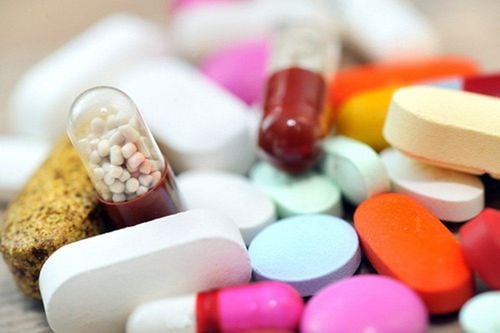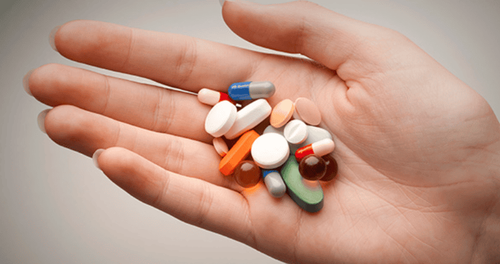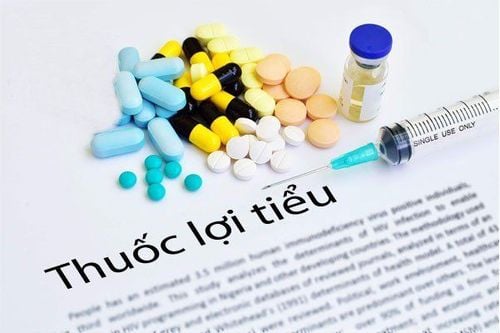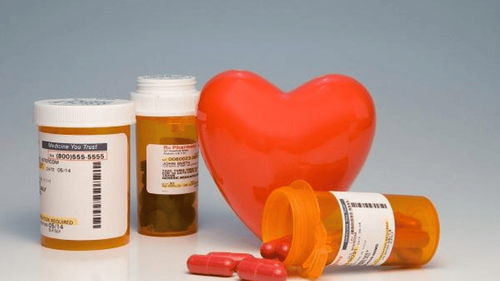This is an automatically translated article.
High blood pressure is one of the leading causes of dangerous complications in the heart, kidneys, brain, eyes, even including the sex life of the patient. Therefore, early detection and treatment of hypertension is an important key to preventing dangerous complications that may occur in the future.
1. What is hypertension?
High blood pressure is a disease that develops silently over time. If not controlled early, it can lead to many dangerous health complications, affecting not only the quality of life but also reducing the patient's life expectancy.
High blood pressure can affect the body in many different ways. This condition puts a lot of pressure on the heart and the body's arteries, causing the heart to work harder for a long time. This can cause your heart to dilate, enlarge, and thicken its walls, gradually leading to heart failure.
In addition, high blood pressure is also a cause of promoting and developing atherosclerosis - a dangerous disease that can lead to cardiovascular complications, such as myocardial infarction or stroke. cerebrovascular . In addition, your risk of stroke also increases when your blood pressure is too high, accompanied by damage to the eyes and kidneys.
You should follow your doctor's advice on high blood pressure treatments, because most conditions can be well controlled through the use of medication, thereby greatly reducing the risk of developing high blood pressure. cardiovascular events or diseases.
2. How does high blood pressure affect the body?
High blood pressure can silently destroy your body for years before symptoms really develop. When high blood pressure is not controlled early, it can lead to disability, reduced quality of life, and even fatal heart attacks and strokes. Treatment and lifestyle changes can help you control your high blood pressure, thereby reducing life-threatening complications.
Here are the health complications that can be caused by uncontrolled high blood pressure, specifically:
2.1 Arterial complications Normally, the healthy arteries in the body are flexible, elastic and elastic. and strong. The smooth lining inside the arteries allows blood to flow freely, providing vital tissues and organs with the nutrients and oxygen they need.
High blood pressure gradually increases the pressure of blood flowing through the arteries, leading to the following damage:
Damage and narrowing of the arteries: High blood pressure causes damage to the cells of the inner lining in arteries. When fats from your diet get into your bloodstream, it can build up in damaged arteries. This also causes the artery walls to become less elastic and impedes blood flow throughout the body. Aneurysm: Over time, the constant pressure of blood moving through an artery weakens, causing part of the artery wall to bulge and create a bulge, also known as an aneurysm. artery. An aneurysm can rupture and cause bleeding, which can be life-threatening. Aneurysms can occur in any artery, but are most common in the body's largest arteries, the aorta. 2.2 Cardiovascular Complications If there is no specific treatment for high blood pressure, it can lead to many dangerous problems for the heart, including:
Coronary artery disease : This condition often occurs when the arteries narrowing and damage caused by high blood pressure, making it difficult for blood supply to your heart. When blood cannot flow freely to the heart, it results in symptoms such as angina, irregular heartbeat (arrhythmia) or heart attack. Left ventricular thickening: High blood pressure forces your heart to work harder to pump blood to the rest of your body. This causes the left ventricle of the heart to thicken, increasing the risk of heart failure, heart attack, and sudden death. Heart failure: Over time, the stress on the heart from increased blood pressure can cause the heart muscle to weaken and work less efficiently than before. This causes your heart health to begin to slowly decline. In particular, heart attacks can aggravate this problem.
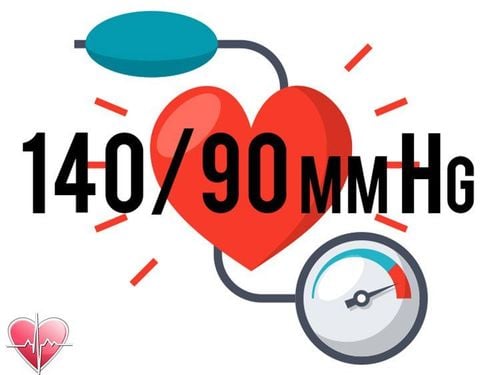
Tăng huyết áp không được kiểm soát sớmcó thể dẫn nhiều biến chứng nguy hiểm
2.3 Brain Complications For your brain to function properly and efficiently will largely depend on a nourishing blood supply. However, if there is no appropriate and timely treatment of hypertension, the patient may experience some of the following brain complications:
Transient ischemic attack (TIA): This condition sometimes persists. called a mini-troke. A TIA is usually a brief or temporary interruption of blood supply to the brain. Hardened arteries or blood clots caused by high blood pressure can lead to a transient ischemic attack. This is also a warning sign of the risk of having a full-blown stroke. Stroke: A stroke usually occurs when part of your brain is deprived of oxygen and nutrients, causing brain cells to die. High blood pressure can cause major damage to blood vessels, causing them to narrow, burst, or leak. In addition, high blood pressure is also the main cause of blood clots forming in the arteries leading to the brain, while blocking blood flow to the brain and increasing the risk of stroke. Dementia: Narrowed or blocked arteries can restrict blood flow to the brain, causing a type of memory loss, known as vascular dementia. Mild cognitive impairment: This condition is a transitional period between changes in cognition and memory, often accompanied by aging and the more serious problems caused by dementia. . Several studies have shown that high blood pressure is a major factor in mild cognitive impairment. 2.4 Kidney complications The kidneys keep the function of filtering excess fluids and waste products from your blood. This process requires the blood vessels to stay healthy and flexible. However, high blood pressure can damage blood vessels and affect your kidneys. In particular, diabetes combined with high blood pressure can worsen damage to your kidneys.
The following are kidney problems caused by high blood pressure, including:
Kidney scarring (glomerulosclerosis): This type of damage usually occurs when the small blood vessels inside the kidney form a scar and are unable to perform functions such as effectively filtering fluids and waste products from the blood. Over time, glomerulosclerosis can lead to kidney failure. Kidney failure: High blood pressure is considered one of the leading causes of kidney failure. When blood vessels are damaged, the kidneys cannot effectively filter waste products from the blood, thereby allowing waste and fluid to accumulate in the kidneys at dangerous levels. In cases of severe kidney failure, you may need dialysis or a kidney transplant. 2.5 Eye complications High blood pressure can adversely affect or damage the small blood vessels that supply blood to your eyes. This can lead to some of the following dangerous eye complications:
Retinopathy : Damage to the retina can cause bleeding in the eye, blurring of vision and lead to complete loss of vision. These risks are even higher if you have diabetes combined with high blood pressure. Accumulation of fluid under the retina (choroidal disease): Choroid disease can cause your vision to be distorted, sometimes leaving scars that cause vision impairment. Nerve damage (optical neuropathy): When blood flow to the eye is blocked, it can damage the optic nerve, leading to bleeding inside the eye or loss of vision.
2.6 Sexual dysfunction The inability or difficulty to maintain an erection (erectile dysfunction) is becoming more and more common in men as they enter their 50s. Especially, men who suffer from erectile dysfunction. People with high blood pressure are even more likely to suffer from erectile dysfunction than other people. This is because your blood flow is restricted when blood pressure is high, which blocks blood flow to the penis.
In addition, women can also experience sexual dysfunction due to high blood pressure. Reduced blood flow to the vagina can reduce sex drive, cause vaginal dryness, and make it harder to achieve orgasm during sex.
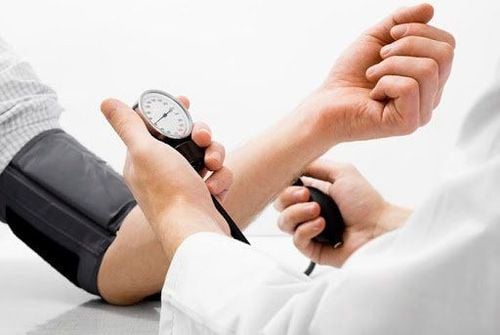
Tăng huyết áp có thể âm thầm huỷ hoại cơ thể trong nhiều năm trước khi các triệu chứng thực sự phát triển
3. High blood pressure emergency
High blood pressure is often a chronic condition that over time can lead to serious health damage years after. Sometimes, the rise in blood pressure is so rapid and dangerous that it becomes a medical problem that requires immediate treatment and hospitalization.
In these situations, high blood pressure can lead to the following problems:
Memory loss, difficulty concentrating, personality changes, irritability and loss of consciousness; Stroke; Chest tightness; Severe damage to the body's aorta; Heart attack; The heart's ability to pump blood is suddenly reduced, leading to pulmonary edema; Blindness; Sudden loss of kidney function; Complications during pregnancy, such as preeclampsia. High blood pressure is a silent disease with few symptoms, but it can cause serious complications. Therefore, regular health check-ups to check for diseases are extremely necessary. Currently, Vinmec International General Hospital is implementing a lot of general health checkup packages suitable for each age, gender and individual needs of customers with a very preferential price policy, including:
Packages General health check-up Work permit- issue of work permit Child general health check-up package Standard general health check-up package Special general health check-up package VIP general health check-up package General health check-up package Diamond The advantage of Vinmec's health check-up packages is that customers will be screened and screened by a system of modern equipment to help support the best diagnosis today such as PET/CT, MRI, etc. CT 640, the world's leading advanced ultrasound system, international standard laboratory system,... After a general examination, if any diseases are detected, customers can use the service. from other specialties at the hospital with outstanding quality of treatment.
Please dial HOTLINE for more information or register for an appointment HERE. Download MyVinmec app to make appointments faster and to manage your bookings easily.
Reference source: mayoclinic.org



